"I HATE math!" Jeffrey says. "It gives me a headache." No wonder. Jeffrey has flunked another math test. His classmates tease him, his parents threaten to hire a tutor, and his teacher gives him even more math homework than ever. So one night, Jeffrey runs away from home. He's heading for Africa, a place where he'll never have to use math again
...or will he?
“Wardlaw speaks honestly to children about their problems in a language they can understand, [letting] them know they are not alone…effectively captures the child’s point of view…highly amusing…should disarm even the fiercest math hater.”
– Santa Barbara Magazine
Excerpt from Me + Math = Headache
I flunked another math test today.
I thought the older I got, the smarter I’d get too. Guess I thought wrong. Third grade math is even harder than second grade math.
At the top of my paper Miss Simmons wrote a big red F and a note that says See me after school. I hate it when Miss Simmons uses a red pencil.
Richard Jensen, who sits next to me, got a B+ on his math test. I know because I peeked at his paper when Miss Simmons put it on his desk.
When Richard tried to look at my paper, I covered it with my hands. I don’t like Richard Jensen. He has sneaky eyes.
My best friends, Craig Zeisloft and Teresa Mendoza, got B’s on their tests, too. When they saw my paper, Craig gave a long, low whistle. Teresa chomped her gum in a real thoughtful way and said, “Wow, Jeffrey. Another F?”
Richard overheard her. “Hey, you must be pretty dumb, Jeffrey,” he said.
“I am not!” I punched Richard in the arm when Miss Simmons wasn’t looking. “And who cares, anyway? I hate math!”
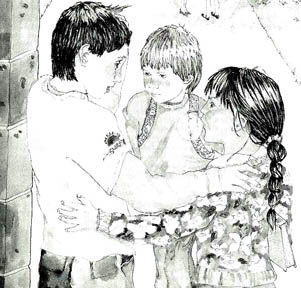
Craig and Teresa console Jeffrey after he gets another F on his math test.

Trivia
The numeral zero was originally called cipher.
Both words derive from the Sanskrit word sunya,
which means void.

Hypatia of Alexandria (b. 370? - d.415 A.D.)
was the first woman in recorded history
known to have taught mathematics –
a field of science most women at that time
were forbidden to learn.
She was murdered for this heresy
by a band of fanatical monks;
her treatises on math
were destroyed during the burning
of the great Library of Alexandria.
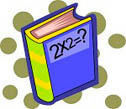
The Egyptians,
one of the first civilizations to use mathematics,
created symbols to represent numbers.
A rod represented number one,
a heal bone stood for ten,
a snare for 100,
a lotus flower for 1,000,
a bent finger for 10,000,
a fish for 100,000,
and a kneeling figure for 1,000,000.

The Mayans devised a method of counting
using only three symbols:
a dot, a bar and a shell (which stood for ‘zero’).
The highest number found in a Mayan inscription
is 1,814,639,800 days or 5,100,000 years!
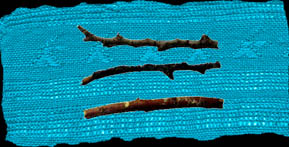
The Mayan number ‘15’
What is three arms + five bones?
Answer: Five hearts, of course.
In Aztec arithmetic, that is!
The Aztec’s system of arithmetic
was not decoded until 2008.
The Aztecs used symbols
such as
hearts, hands, arms, bones and arrows
to stand for fractions.
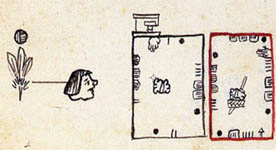
Both the Aztecs and the Mayans calculated in base 20.
The earliest calculating device in the world is generally thought to be the Chinese abacus.

Mathematician Robert Recorde
developed the equal sign (=) in 1557.
In 1938, at the age of nine,
Milton Sirotta created the term ‘googol’
to represent the number 1
with one hundred zeros following it.

Pi (pronounced ‘pie’)
represents the circumference of a circle.
Pi = 3.1415926535…
Pi has been calculated
to over 1 trillion numbers
past the decimal point.
The number will continue infinitely
without repeating
National Pi Day is March 14, at 1:59.
The holiday even has its own website:
http://www.piday.org
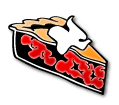
111,111,111 x 111,111,111 = 12,345,678,987,654,321
What five-digit number,
when multiplied by 4,
is the same number
with the digits in reverse order?
21978!
21978 x 4 = 87912.

If you wanted to count to a million
and each count lasted one second,
it would take you
twelve days
to reach your goal.
How long would it take
to count to a billion?
Thirty-two years!

40 is the only number whose letters are in alphabetical order.
[FORTY]
A 'jiffy' is an actual unit of time for 1/100th of a second.
If you add up the numbers
1-100 consecutively,
(1+2+3+4+5, etc)
the total is
5050.
The letters K and M are both symbols for the number 1,000
Cool Math Links







